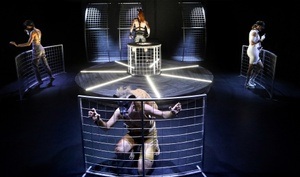Draußen vor der Tür
In the organizer's words:
Imagine there was a war and people returned home.
Back to a bombed-out city, back to a family that is perhaps long gone. Gone like the woman's love, which now belongs to another man. Back to a society that has not yet found its way back to each other.
This is the experience of former soldier Beckmann, a so-called returnee who hasn't even kept his glasses. A pair of gas mask goggles serves him as a replacement, the war literally still clings to him and remains visible to all. A stranger who calls himself "the other" tries to give the hopeless man some hope. In his despair, Beckmann has already thrown himself into the water, but the Elbe will not allow him to end his life. Tired of life, plagued by hunger and a stiff leg, dreams and reality become blurred for him. Beckmann has many unanswered questions, above all about guilt and responsibility. The question of how life can go on. Faith, love and hope are fading.
"Is there no one, no one to answer?"
Wolfgang Borchert writes the drama Draußen vor der Tür in just eight days in his hospital bed. In 1947, is premiered at the Hamburg Kammerspiele. Translated into 40 languages, the anti-war play quickly becomes one of the most important texts in post-war literature.
This content has been machine translated.












